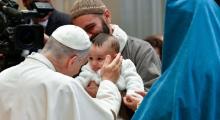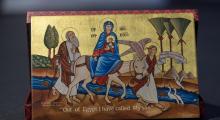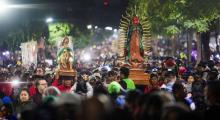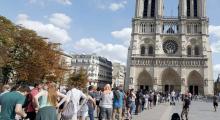Issued by the Catholic Center for Studies and Media - Jordan. Editor-in-chief Fr. Rif'at Bader - موقع أبونا abouna.org
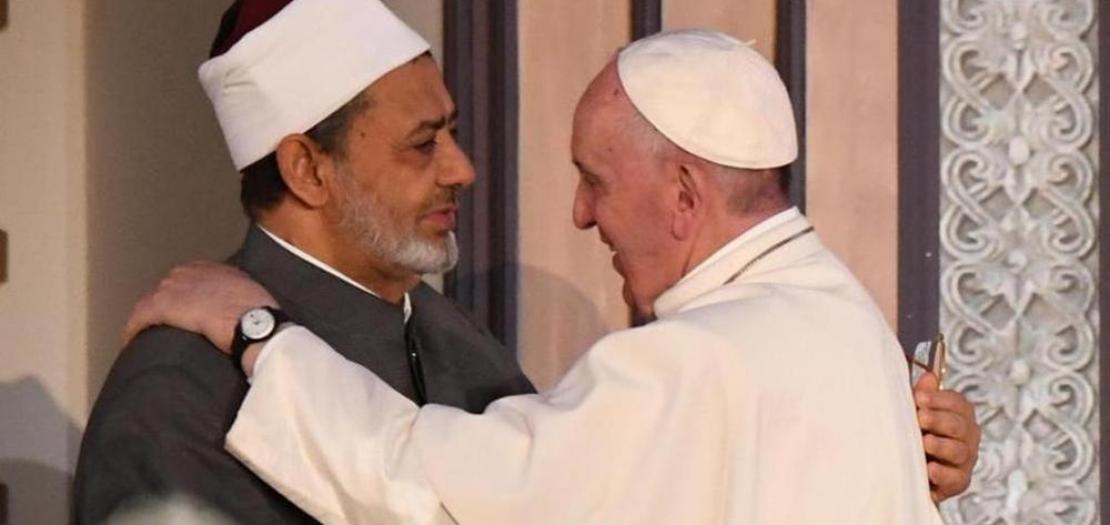
rancis at Al Azhar: “As religious leaders we are called to condemn attempts to justify every form of hatred in the name of religion.” And it is essential to “block the flow of money and weapons destined to those who provoke violence”.
“Together let us affirm the incompatibility of violence and faith, belief and hatred. As religious leaders we are called to condemn attempts to justify every form of hatred in the name of religion” Pope Francis, in one of the symbols of Sunni Islam, Al Azhar University in Cairo, before Egyptian religious leaders and participants in the Peace Conference, reiterates that there can be no religious cover for terrorism. He invites “to eliminate situations of poverty and exploitation where extremism more easily takes root, and in blocking the flow of money and weapons destined to those who provoke violence.”
A “minute of silence” for “victims of terrorism of all nationalities” was observed at the Conference: moments of concentration were demanded by the Great Imam of Al-Azhar, Ahmed Al Tayyib, at the beginning of his speech broadcast live by Egyptian TV.Immediately after receiving the Pope at the Sunni University Conference Center, together with a group of children from 60 countries, the great imam Al Tayyeb took the floor: the visit of Pope Francis to al-Azhar is “historical,” the Great Imam of Al-Azhar said in his speech. “The visit to al-Tayyib - he added - occurs at a time of lost peace sought by nations and peoples who are fleeing from their own countries.” The Great Imam of Al-Azhar states that “Islam is not a religion of terrorism” as it is not Christianity and Judaism. Islam is “not a religion of terrorism” only “because there are people who have badly interpreted” its message “and have shed blood of human beings, intimidated by people,” he points out. Likewise, “Christianity is not a religion of terrorism” only “because there has been a community that has raised the cross” and killed (”raised souls”), he adds implicitly referring to the Crusades. And “not even Judaism is a religion of terrorism” for “the occupation of Palestinian territories”. So “if Islam is referred to as terrorist” no religion or civilization will be saved. “
He also pointed to international arms trafficking and political decisions taken at international level, as responsible for the “chaos” ruling in many countries. Al-Tayyib therefore emphasized that it is time for religions to accept the call for peace, equality and dignity of all human beings, “regardless of faith or skin color.” After him, Bergoglio held his first public talk of the trip and started his speech by referring to Ahmed Al Tayyib as his “dear brother”. He then continued “In Egypt” which he defines as “ land of civilization and covenant” the Pope remembers, first of all, the importance of a “proper education of coming generations” of a training corresponding to “the nature of man as an open and relational being “, in order to overcome “temptations to rigidity and closed-mindedness.”
Francis remembers teachings learned from the past: “evil only gives rise to more evil, and violence to more violence, in a spiral that ends by imprisoning everyone.” He talks about dialogue, “especially interreligious dialogue,” in which “we are constantly called to walk together, in the conviction that the future also depends on the encounter of religions and cultures “. He offers three “basic areas” that if properly linked to one another, can assist in this dialogue. Starting with the duty of identity, “The duty to respect one’s own identity and that of others, because true dialogue cannot be built on ambiguity or a willingness to sacrifice some good for the sake of pleasing others.”; The courage to accept differences, because those who are different, either culturally or religiously, should not be seen or treated as enemies, but rather welcomed as fellow-travellers, in the genuine conviction that the good of each resides in the good of all. And finally, “Sincerity of intentions, because dialogue, as an authentic expression of our humanity, is not a strategy for achieving specific goals, but rather a path to truth”
The best way to build the future together is to “to educate in respectful openness and sincere dialogue with others, recognizing their rights and basic freedoms, particularly religious freedom.” Because “the only alternative to the civility of encounter is the incivility of conflict. To counter effectively the barbarity of those who foment hatred and violence, we need to accompany young people, helping them on the path to maturity and teaching them to respond to the incendiary logic of evil by patiently working for the growth of goodness.”
Pope Bergoglio quoted St. John Paul II twice urging Christians and Muslims to call one another “brothers and sister.” He then observed, “Differences of religion have never been an obstacle, but rather “a form of mutual enrichment in the service of the one national community”. Invoking also the intercession of Saint Francis of Assisi “who eight centuries ago came to Egypt and met Sultan Malik al Kamil.”
Francis emphasized the importance of dialogue between religions, “in the face of a dangerous paradox of the present moment. On the one hand, religion tends to be relegated to the private sphere, as if it were not an essential dimension of the human person and society.” While on the other hand, “the religious and political spheres are confused and not properly distinguished.” The first is a reference to Western secular societies, the second to countries where religious norms are imposed on everyone.
The Pope reaffirms his conviction: especially today, “religion is not a problem but a part of the solution,” the antidote against “the temptation to settle into a banal and uninspired life, where everything begins and ends here below.” Bergoglio cites the Ten Commandments and in particular “Thou shalt not kill” (Ex 20:13) explaining that violence “is the negation of every authentic religious expression.”
“As religious leaders - he adds - we are called therefore, to unmask the violence that masquerades as purported sanctity and is based more on the “absolutizing” of selfishness than on authentic openness to the Absolute. We have an obligation to denounce violations of human dignity and human rights, to expose attempts to justify every form of hatred in the name of religion, and to condemn these attempts as idolatrous caricatures of God: Holy is his name, he is the God of peace, God salaam. Peace alone, therefore, is holy and no act of violence can be perpetrated in the name of God, for it would profane his Name.
“Let us say once more a firm and clear “No!” to every form of violence, vengeance and hatred carried out in the name of religion or in the name of God”.
Francis said “Together let us affirm the incompatibility of violence and faith, belief and hatred. Together let us declare the sacredness of every human life against every form of violence, whether physical, social, educational or psychological. Unless it is born of a sincere heart and authentic love towards the Merciful God, faith is no more than a conventional or social construct that does not liberate man, but crushes him.”
In the final part of his speech, Bergoglio said that “it is of little or no use to raise our voices and run about to find weapons for our protection: what is needed today are peacemakers, not fomenters of conflict; firefighters and not arsonists; preachers of reconciliation and not instigators of destruction.” And he said that today “it is disconcerting to note that, as the concrete realities of people’s lives are increasingly ignored in favor of obscure machinations, demagogic forms of populism are on the rise. These certainly do not help to consolidate peace and stability.” But “no incitement to violence will guarantee peace, and every unilateral action that does not promote constructive and shared processes is in reality a gift to the proponents of radicalism and violence.”
In order to prevent conflicts and build peace, Francis concluded, “It is essential that we spare no effort in eliminating situations of poverty and exploitation where extremism more easily takes root, and in blocking the flow of money and weapons destined to those who provoke violence. Even more radically, an end must be put to the proliferation of arms; if they are produced and sold, sooner or later they will be used “So, “only by making transparent the tricky maneuvers that fuel the war cancer can they prevent the real causes.” Only by bringing into the light of day the murky manoeuvrings that feed the cancer of war can its real causes be prevented. National leaders, institutions and the media are obliged to undertake this urgent and grave task. So too are all of us who play a leading role in culture; each in his or her own area, we are charged by God, by history and by the future to initiate processes of peace, seeking to lay a solid basis for agreements between peoples and states.”
A strong and prolonged embrace between Pope Francis and the Great Imam of Al-Azhar marked the end of the Sunni Muslim authority’s speech. The embrace between the Pope and the Great Imam was amid the convoluted applause of all the participants who stood up as a way to show a sense of sharing before Pope Francis took the floor for his speech at the International Conference on Peace.
A second hug and a long handshake between Pope Francis and the Great Imam of Al-Azhar then greeted the end of the Pontiff’s speech.


